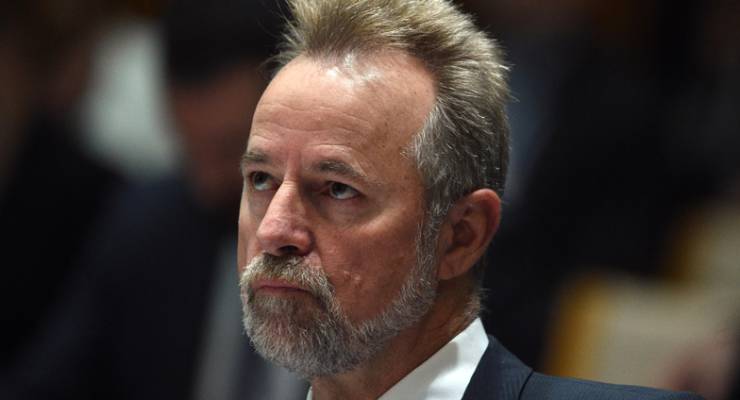
In the last month we have witnessed a most unusual David versus Goliath political battle in the north between Joe Morrison, CEO of the Northern Land Council, and Nigel Scullion, the federal Minister for Indigenous Affairs. Scullion is looking to dilute the power of the Northern Land Council in part by dividing its senior management from its elected members. Morrison, awake to such divide-and-conquer tactics, has called for Scullion to be replaced as minister if Turnbull wins the election.
There is a great deal at stake in this most unedifying public spectacle during the current federal election campaign, which is why Morrison is responding so strategically, forcibly and publicly to Scullion’s proposals to reform or re-form the Aboriginal Land Rights (Northern Territory) Act 1976.
This year marks the 40th anniversary of the passage of this most progressive land rights law in Australia.
When Justice Edward Woodward headed the Aboriginal Land Rights Commission in 1973 and 1974 he made three key recommendations incorporated in law:
- traditional owners must have a right to veto development on their land, what is called, today, “free prior and informed consent” (FPIC) rights;
- land councils should be established as statutory authorities with legal functions to represent traditional owners in the management of their lands; and
- royalties (or their equivalents) raised from mining on Aboriginal land must be earmarked for Aboriginal use, including for the funding of land councils to maintain a modicum of independence from standard budgetary processes.
These key features of land rights law have never been embraced by the conservative side of politics because they give traditional owners a right of veto alongside powerful institutions to represent their interests.
In 1996 the Howard government began a process to dilute this law that came to fruition a decade later when it controlled the Senate. The relative financial autonomy of land councils was seriously diminished and a new 99-year leasing option was introduced to shift control of townships to the Executive Director of Township Leasing in Canberra rather than traditional owners and land councils.
The amendments were strongly opposed by the two mainland land councils, but to no avail.
In 2013 Scullion was appointed Minister for Indigenous Affairs, the trusty lieutenant of Tony Abbott, the prime minister for indigenous affairs.
Scullion’s loyalties are divided between his political allegiances to the CLP (elected to office in the NT in 2012), the traditional owners he purports to speak for, and his official duties to indigenous people Australia-wide.
His performance nationally has been criticised in two recent Senate inquiries on:
- the Indigenous Advancement Strategy tendering process; and
- his effort to reform the Community Development Program, which has mainly resulted in financial penalties applied to impoverished participants, rather than jobs, skyrocket.
The evidence on Closing the Gap outcomes under his ministerial watch are underwhelming, as pointed out bluntly by the Productivity Commission in its performance assessment.
As always, picking a fight on NT land rights serves as a useful distraction from such disappointments, in this case a fight that could do serious damage to traditional owner interests.
Scullion has unfinished business. His prolonged efforts to gain a foothold for 99-year leases on the mainland have failed, thwarted by the NLC and its sound advice. And his efforts to control delegation of land council powers were also thwarted by a hostile Senate responsive to land council concerns.
Scullion says he wants to empower traditional owners, but only, I suspect, if they support his agenda to commercially develop the north.
His latest provocation is to propose direct funding to traditional owners to control their land. This proposal, to be paid for with royalties raised on Aboriginal land, implies that land councils are not doing their job well and dilutes and duplicates their statutory roles.
Morrison is an Aboriginal man whose loyalties are undivided: his overriding agenda is to build a strong institution with capacity to represent traditional owners in the Top End; he is astute and knows that it is FPIC property rights that are ultimately at stake in this latest wrangle.
Ultimately, it is clear to most, including the mining industry, that traditional owners need strong land councils to represent their interests. It is such strong representation that will result in efficient and effective agreement making.
Whether David defeats Goliath will depend on who is prime minister next month; if it’s Turnbull, will he listen to the clarion call from Aboriginal people for a change or allow Scullion to finish his business? If it’s Shorten, Scullion’s influence will be history.







Crikey is committed to hosting lively discussions. Help us keep the conversation useful, interesting and welcoming. We aim to publish comments quickly in the interest of promoting robust conversation, but we’re a small team and we deploy filters to protect against legal risk. Occasionally your comment may be held up while we review, but we’re working as fast as we can to keep the conversation rolling.
The Crikey comment section is members-only content. Please subscribe to leave a comment.
The Crikey comment section is members-only content. Please login to leave a comment.